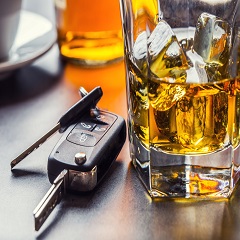
An offence commonly known as ‘drink driving’, is committed by driving a vehicle with alcohol levels in the body exceeding the legal limit. The legal limits are as follows:
What is important to note however, is that it is hard to pin point how many units and drinks exactly amounts to this as various factors can affect the concentration of alcohol in the body. These include things like gender, body mass and how quickly the body absorbs alcohol into the blood stream.
The penalty a person can potentially receive for committing this type of offence varies from a fine up to £5000 and/or 6 months imprisonment. Furthermore, a driver found guilty of this offence will be disqualified from driving for a minimum period of 12 months. The severity of the sentence will depend on the level of consumed alcohol and previous offences of similar nature.
Furthermore, factors that will be taken into account when sentencing can include matters such as weather and road conditions, involvement in a car accident, carrying passengers and whether the accused drives for hire or reward. Any evidence of an unacceptable standard of driving will also be taken into account.
However, there are defences and mitigating factors that may be taken into account and will need to be considered very carefully with your solicitor. It is important to get in touch with an experienced solicitor who will be able to guide you through the process, consider any potential defences and represent you before the Magistrates Court.
In certain circumstances the disqualification can be significantly reduced or even avoided if special reasons can be established.
A special reason is not a defence but a unique circumstance that is relevant to your case and directly related to the commission of the offence itself. If a special reason exists in your case your solicitor will advise you to plead guilty and they will put forward your arguments for the special reasons. A person who argues the existence of special reasons bears the burden of proving that such reasons exist.
Importantly, the defences mentioned are not a guarantee of being cleared of any charges and every case is different and as such professional legal advice and representation is of crucial importance in order to explore all the possibilities to obtain the best result possible.
Here at IMD Solicitors, we have a team specialising in criminal law which have successfully dealt with cases of this nature.
Contact our team today on 0330 107 0107 or email us at: info@imd.co.uk.
This article is for general information only and does not constitute legal or professional advice. Please note that the law may have changed since this article was published.